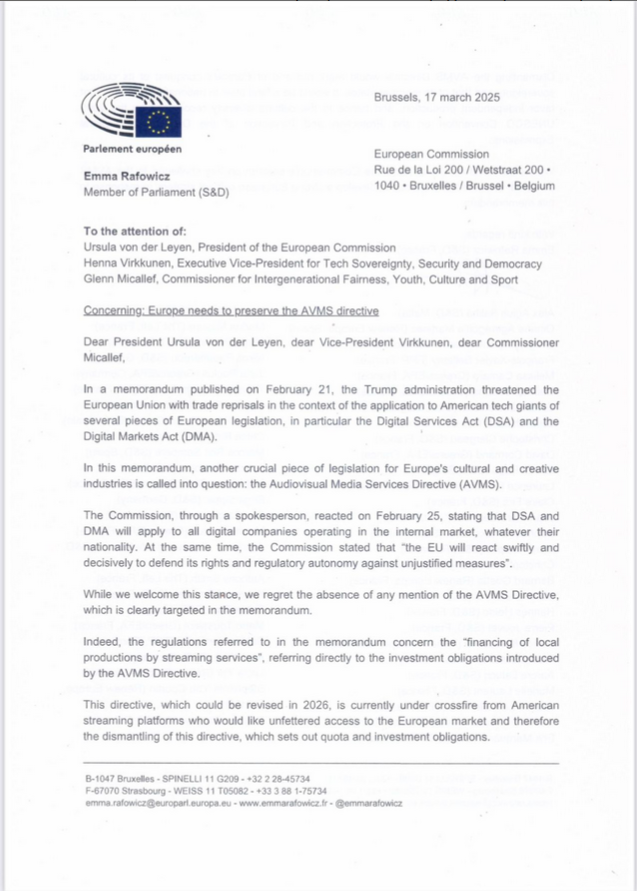Following US President Donald Trump's threatened trade war against dozens of countries around the world, the Motion Picture Association (MPA), which represents the interests of Disney, Netflix, Paramount, Amazon Prime/MGM, Sony Pictures, Universal and Warner Bros, has found fertile ground for a more aggressive trade policy and further expansion in the European and global market.
The MPA has sent a memorandum to the United States Trade Representative (USTR) outlining what it considers to be unfair trade practices. It opposes not only the European Digital Services Act (DSA) and Digital Markets Act (DMA), but also the Audiovisual Media Services Directive (AVMS). The issue prompted a group of MEPs, led by Emma Rafowicz, who sent a letter to the President of the European Commission, Ursula von der Leyen, and Commissioners Henna Virkkunen and Glenn Micallef urging them to protect the AVMS Directive.
The memorandum was drafted at the request of the United States Trade Representative, “for comments to assist in reviewing and identifying unfair trade practices and initiating all necessary actions to investigate harm from non- reciprocal trade arrangements”. The MPA responded with a multi-page paper and a comment that it “appreciates the Trump administration’s interest in addressing and dissuading our international trading partners from adopting restrictive, unfair, and often discriminatory measures”.
Among the EU countries named by the MPA for unfair trade practices are Belgium, France, Germany, Italy, Spain and Poland, but the list also includes many other non-EU countries such as Australia, Brazil, South Africa and South Korea.
According to the MPA, the full potential of U.S. audiovisual exports is being hindered by a number of unfair trade practices, as countries around the world maintain content restrictions, quotas, advertising restrictions and limitations on foreign investment, traditionally aimed at both theatrical distribution channels and pay-TV.
Οn the European market, the memorandum makes extensive reference to the Audiovisual Media Services Directive (AVMSD), which came into force in 2018 and has been at least partially implemented by all member states.
The AVMSD requires EU Member States to ensure that broadcasters reserve a majority of their transmission time for European works, excluding time allotted to certain categories of programming, such as news and sports. In addition, 10% of transmission time must be dedicated to works produced by independent producers, with an additional requirement that an adequate proportion of this sub-quota must be dedicated to recent works.
It also requires EU Member States to ensure that video on demand (VOD) services reserve at least a 30% share in their catalogues for European works and ensure prominence of these works.
Μember States may impose a higher overall quota as well as sub-quotas, such as for local works or works in a specific language.
The AVMSD also allows EU Member States to require media service providers targeting the audience in their territory to contribute financially to the production of European works. These investment obligations typically require media service providers to invest directly in European or domestic works or contribute to a national film fund. According to MPA more than half of EU Member States have imposed investment and all the above obligations could fuel “an inflationary trend in production costs and work against the objective of supporting and attracting foreign investment and opening the market to new entrants”.
 The targeting of the AVMS Directive by the Association of American Film and Television Producers has raised concerns among MEPs who have addressed a letter to the President of the European Commission, Ursula von der Leyen, and Commissioners Henna Virkkunen and Glenn Micallef. In their letter, the MEPs stress that the Audiovisual Media Directive is "under attack from American streaming platforms, which want unfettered access to the European market and the dismantling of the Directive". According to the MEPs, this would mark the end of Europe's conquest of its cultural sovereignty and would be a fatal blow to national ecosystems that favor independent production and hence cultural diversity.
The targeting of the AVMS Directive by the Association of American Film and Television Producers has raised concerns among MEPs who have addressed a letter to the President of the European Commission, Ursula von der Leyen, and Commissioners Henna Virkkunen and Glenn Micallef. In their letter, the MEPs stress that the Audiovisual Media Directive is "under attack from American streaming platforms, which want unfettered access to the European market and the dismantling of the Directive". According to the MEPs, this would mark the end of Europe's conquest of its cultural sovereignty and would be a fatal blow to national ecosystems that favor independent production and hence cultural diversity.
Read the memorandum here.
--
Photo credit: Vancouver Film
Photo source









 The targeting of the AVMS Directive by the Association of American Film and Television Producers has raised concerns among MEPs who have addressed a letter to the President of the European Commission, Ursula von der Leyen, and Commissioners Henna Virkkunen and Glenn Micallef. In their letter, the MEPs stress that the Audiovisual Media Directive is "under attack from American streaming platforms, which want unfettered access to the European market and the dismantling of the Directive". According to the MEPs, this would mark the end of Europe's conquest of its cultural sovereignty and would be a fatal blow to national ecosystems that favor independent production and hence cultural diversity.
The targeting of the AVMS Directive by the Association of American Film and Television Producers has raised concerns among MEPs who have addressed a letter to the President of the European Commission, Ursula von der Leyen, and Commissioners Henna Virkkunen and Glenn Micallef. In their letter, the MEPs stress that the Audiovisual Media Directive is "under attack from American streaming platforms, which want unfettered access to the European market and the dismantling of the Directive". According to the MEPs, this would mark the end of Europe's conquest of its cultural sovereignty and would be a fatal blow to national ecosystems that favor independent production and hence cultural diversity.